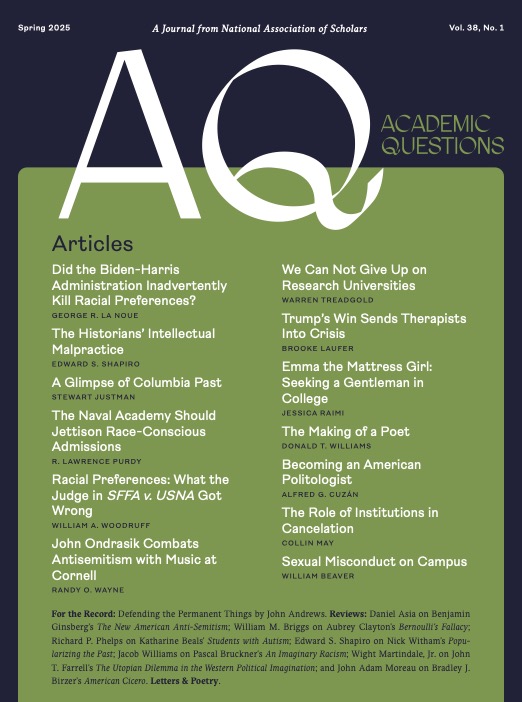On January 5, 2025, attendees at the annual convention of the American Historical Association in New York City voted 428 to 88 to approve a resolution strongly condemning Israel for its response to the atrocities committed by Hamas on October 7, 2023. The resolution was sponsored by a group called Historians for Peace and Democracy which was established in 2003 to oppose America’s war in Iraq. It had submitted anti-Israel resolutions at the 2015 and 2016 conventions of the AHA that were voted down by the general membership. The 2016 vote was 51 in favor and 111 opposed.
The 2025 resolution accused Israel of committing “scholasticide” in Gaza, attacked the United States for providing Israel with the weapons used to intentionally destroy the educational system of the region, and called for an immediate and permanent ceasefire in the Gaza war.1 Barbara Weinstein, a Latin American historian at New York University and a former president of the AHA, spoke for many in praise of the resolution. “Over the years,” she said, “it has become increasingly clear that we can’t have a narrow definition of what our roles are as historians.” Those with memories of the chaos in higher education of the 1960s caused by its politicization could only shake their heads in bewilderment.
No mention was made in the resolution or by its supporters regarding the events of October 7 which precipitated the actions of Israel. Rather, they accused Israel, and not Hamas, of genocide. It goes without saying that few of the resolution’s supporters were specialists in the history of the Middle East or even familiar with its contemporary political and military developments. Neither was evidence presented that Israel was guilty of any form genocide. In fact, despite the fact that Hamas has been known to divert assistance away from civilians, since the Oct. 7 Hamas attack, Israel has facilitated the transfer of 11,943 humanitarian aid trucks into Gaza. As of February 4, 2025 these deliveries included 144,030 tons of food, 20,780 tons of water, 23,160 tons of shelter equipment, 16,700 tons of medical supplies, 146 tanks of fuel, and 222 tanks of cooking gas.2 Israel has also facilitated the transportation of hundreds of children injured during the war to hospitals in the Persian Gulf.
After the vote supporters of the resolution punctuated its passage with shouts of “Free Free Palestine.”3
Opponents of the resolution made a convincing case. Jonathan Rose, an historian at Drew University in New Jersey, pointed out that the Arab-Israeli conflict “is probably the most intensely debated historical question confronting us today,” and that if Historians for Peace and Democracy “want to present their own simple-minded version of history, in which Israel is always the villain, they are free to do so under their own imprimatur. But they have no right to speak for the rest of us in the AHA.” Anne Hyde, a University of Oklahoma history professor and a member of the AHA’s council, worried that such resolutions undermined the AHA’s reputation for impartiality. Furthermore, she noted, the war in Gaza “is not settled history, so we’re not clear what happened or who to blame or when it began even, so it isn’t something that a professional organization should be commenting on yet.” Five speakers spoke against the resolution at the general meeting. The most important critique was by Jeffrey Herf, a University of Maryland emeritus professor of history and a prominent authority on the Holocaust and anti-Semitism.
The resolution, he said, did “not meet basic standards of historical scholarship or, for that matter, of fair-minded journalism and political analysis. As such, it constitutes an assault on truth and on the skill and insight one expects from professional historians…. Were it to be adopted … it would severely damage if not destroy the AHA’s credibility as a professional organization devoted to the search for truth about the past.” Unfortunately, the vote in New York City “lent credence to the view that historians in the United States see no distinction between partisanship and scholarship.”
The resolution, Herf observed, was based on the conclusions of the United Nations Office of the High Commissioner for Human Rights and the United Nations Human Rights Council, two notorious anti-Israel bodies, and their reports regarding Gaza both before and after the October 7 attacks ignored the virulent antisemitism of Hamas, the extensive tunnel system Hamas built in Gaza under the oblivious eyes of United Nations officials, Hamas’ practice of hiding its troops in homes, mosques, schools, United Nations facilities, and hospitals, and took at face value unverified reports and data from Hamas.4
The National Association of Scholars also strongly condemned the AHA resolution for seeking to hijack the good name of the organization on behalf of Hamas’ “mass murderers” and to blur Hamas’ responsibility for the carnage in Gaza. “The resolution’s lack of historical perspicuity,” the NAS statement noted, “speaks badly of the professional judgment of the historians who voted for it.” Why, it asked, “should Americans pay attention to the moral and professional judgment of an organization that provides moral support for Hamas in its savage, unjust, and indecent war against Israel?”
Scholarly organizations generally avoid becoming involved in contentious issues, although the AHA did make an exception in February, 2022 when its council condemned “in the strongest possible terms Russia’s recent invasion of Ukraine.” The association argued then that Vladimir Putin’s professed reasons for the invasion was “twisted mythology” which distorted Ukraine's history and therefore warranted a response by historians. In the case of the 2025 resolution, the accusation of scholasticide was the rationale used to justify the AHA becoming involved in an issue seemingly outside its purview and competence.
After the vote the resolution was passed on to the association’s elected council which would decide whether it would become the official position of the AHA. By a vote of 11 to 4 the council rejected the resolution, stating that it lay outside the association’s mission and purpose which was limited to teaching, research, and publication, the collection and preservation of historical documents, and broadening the historical knowledge of the public. James Grossman, the executive director of the AHA, emphasized the harm that such resolutions posed to the credibility of the organization. “As a membership organization,” he said, “we keep our distance from issues that are controversial within and among our members. And we keep in mind that our effectiveness rests on our legitimacy, our reputation for even-handedness, professional integrity and appropriately narrow boundaries.” This was precisely the outlook which Weinstein found so reprehensible.
Daniel A. Segal, a professor at Pitzer College in California, was outraged by the council’s vote. “In a time of emerging fascism,” he avowed, the AHA should be “an active part of the democratic resistance” rather than caving in to the powers that be in this age of Trump. Moreover, the council’s vote, he asserted, was part of a campaign to silence those dissenting from sunny views of American history. “The best U.S. history,” he said, “teaches that sexism, racism, settler colonialism, ethnic cleansing, and genocide are central to U.S. history and society.” Such a one-sided view of American history is unfortunately not uncommon. Yet it is difficult to reconcile it with the fact that the United States, at least for the last 150 years, has been the chosen destination of the largest portion of the world’s migrants.
Another supporter of the resolution declared that “we are extremely shocked by this decision, and disappointed” by the council’s decision which “overturns the democratic decision at the business meeting and the landslide vote.” But it is hard to believe that the resolution’s advocates ever thought it would become the official policy of the association. In fact the vote was hardly an accurate reading of the wishes of the association’s members or a mandate to do much of anything. Most of the convention attendees did not attend the meeting, and the 428 who did vote for the resolution comprised less than three percent of the association’s 10,450 members.
AHA council, despite its vote, did seemingly accept the unproven charge of scholasticide, stating that it “deplores any intentional destruction of Palestinian educational institutions, libraries, universities and archives in Gaza.” There was, however, no evidence that the Israeli military intentionally targeted educational sites in Gaza, or that the destruction of such sites was something other than collateral damage caused by Hamas’ practice of hiding within civilian institutions. The charge of scholasticide was a red herring.
But the resolution’s backers were hardly academic outliers. Three months earlier the executive council of the Modern Language Association had prevented a resolution being voted on at its annual convention in New Orleans which accused Israel of scholasticide and praised the boycott, divestment, and sanctions movement targeting the Jewish state. When the veto was announced at a general meeting, demonstrators held up a banner reading “MLA Is Complicit in Genocide” and chanted “Free Palestine!” while leaving the venue. The MLA council later suggested that it would have welcomed a less divisive statement which focused on scholasticide and omitted reference to BDS. This did not mollify the MLA Members for Justice in Palestine which urged its membership to end their support of the organization.
The outlook motivating such resolutions is not restricted to academia. On January 12, 2025, the CBS program 60 Minutes ran a segment on the resignation of three State Department officials due to America’s supplying of bombs and airplanes to Israel and its ignoring of the restrictions Israel had placed on the supplying of food and medicine to Gaza. The United States, they claimed, has been complicit in the deaths of innocent Gazan civilians, including many children, due to the bombing and starvation. America’s stance toward the war in Gaza, they charged, ran counter to the nation’s interests in the region since it had inflamed Arab public opinion, increased the likelihood of terrorist attacks against American individuals and institutions, and “put a target on America’s back,” as one put it.5
The 60 Minutes segment was widely condemned. Critics pointed out that it barely mentioned the October 7, 2023 Hamas attacks which caused the retaliatory destruction in the first place, or that Hamas soldiers were imbedded in schools, hospitals, and apartment buildings, thereby making them legitimate targets according to widely accepted international rules of warfare. Nor did it note that none of this damage would have ever occurred if Hamas had surrendered or taken up Israel’s offer to peacefully leave Gaza. The Washington Examiner said the segment was “shoddy” journalism. The American Jewish Committee issued a press release on January 13 accusing 60 Minutes of reckless, one-sided, and inaccurate reporting. The segment, the AJC charged, ignored the fact that the deaths and damage in Gaza were due to the actions of Hamas, whitewashed Hamas fighters by calling them “militants” rather than terrorists, relied on unverified and likely exaggerated estimates of the number of Gazan civilians killed during the war, repeated false claims regarding Israel’s impeding of aid to the Gazan population, omitted any mention of the 250 hostages seized by Hamas, and promoted the “outlandish notion” that Israel should try to make peace with the instigators of the October 7 attacks. 60 Minutes, the AJC said, had directly played “into the hands of the enemies of the west who aim to show that support for Israel is not in the United States’ best interest.”
The twentieth century British economist John Maynard Keynes believed that the history of ideas was crucial for understanding the contemporary world. “The ideas of economists and political philosophers, both when they are right and when they are wrong are more powerful than is commonly understood,” he wrote. “Indeed, the world is ruled by little else. Practical men, who believe themselves to be quite exempt from any intellectual influences, are usually slaves of some defunct economist.” The resolutions presented at the AHA and MLA conventions did not emerge de novo from defunct economists and political philosophers, but from ideas propagated by academic historians and social scientists. In the current academic crisis, the most prominent of these ideas is “settler colonialism.”
Settler colonialism claims that the most important theme of the history of the last several centuries has been the dispossession of native peoples in Asia, Africa, and the Americas by white settlers from Europe and the United States.6 colonialism is a profoundly anti-Western theory, and its targets are the generally prosperous countries of Europe and North America such as Great Britain, Holland, Canada, and the United States. Among the earliest founders of settler-colonialist theory was the Anglo-Australian historian Patrick Wolfe (1949-2016), author of Colonialism and the Transformation of Anthropology: The Politics of an Ethnographic Event (1999) and Traces of History: Elementary Structures of Race (2016). As enunciated by Wolfe and others, settler-colonialism differs from traditional colonialism in that it features not only the control of the economy and government of a foreign land by the imperial power, as in the case of the British in India and Holland in the Dutch East Indies, but also the mass settlement of settlers from the imperial country. The Boers in South Africa and the British in North America and Australia are models of settler colonialism. For Wolfe and others there is a fundamental difference between traditional colonialism and settler colonialism. Traditional colonialism seeks to exploit the native population while settler colonialism seeks to replace it either by forcing it to move or by exterminating it. The concept of genocide is central to the concept of settler colonialism and the word is tossed about with abandon in its discussions, infuriating those who have either survived an actual genocide or have had close relations with those who have.
For a half-century pro-Palestinian advocates have used settler colonialism to frame their cause not simply as a local struggle between Arabs and Jews, but as part of a much larger and more significant story: the global conflict between Western imperialists and their native victims. As Natan Sharansky has noted, the ideology of settler colonialism has “galvanized public opinion against the alleged crimes of the ‘settler colonialist’ Zionist oppressor.”7 Those who voted for the 2025 AHA resolution view Israel as a prime example of contemporary settler colonialism and the genocidal tendencies inherent in it, and believe the most important theme of Israel’s history has been the forceful displacement by Westernized Jewish immigrants of the native Arab population of Palestine who now live under intolerable social, economic, and political conditions in Gaza, refugee camps, and settlements in the West Bank of the Jordan River.
As Adam Kirsch points out in his book On Settler Colonialism, “For many academics and activists, describing Israel as a settler-colonial state was a sufficient justification for the Hamas attack.”8 Hamas is thus no longer an antisemitic gang of murderers, rapists, and kidnappers, and October 7, 2023 is seen as an understandable and even defensible response to settler colonialism. When the presidents of Harvard, the University of Pennsylvania, and the Massachusetts Institute of technology testified before the United States Congress, they were asked whether calling for the killing of Jews violated their campus rules. They responded that it would depend on the “context.” The context was provided by settler colonialism, and its popularity on the Left explains the efforts to bend over backwards when discussing the barbarism of Hamas on October 7.
One is reminded of the remark of George Orwell when he heard during World War II of the idea that American troops had come to Europe not to fight the Germans but to put down a left-wing English revolution. “One has to belong to the intelligentsia to believe things like that: no ordinary man could be such a fool.”9
Edward S. Shapiro is professor emeritus of history at Seton Hall University; [email protected]. He is the author of A Time for Healing: American Jewry Since World War II (1992), Crown Heights: Blacks, Jews, and the 1991 Brooklyn Riot (2006), A Unique People in a Unique Land: Essays on American Jewish History (2022), and the editor of Letters of Sidney Hook: Democracy, Communism and the Cold War (1995). Shapiro’s “The Politics of History,” a review of Nick Witham’s "Popularizing the Past: Historians, Publishers, and Readers in Postwar America,” also appears in this issue of AQ.
1 The resolution reads in part “Whereas the US government has underwritten the Israel Defense Forces (IDF) campaign in Gaza with over $12.5 billion in military aid between October 2023 and June 2024. Whereas that campaign, beyond causing massive death and injury to Palestinian civilians and the collapse of basic life structures, has effectively obliterated Gaza’s education system.”
2 “Israel Facilitates Record Aid to Gaza, Foundation for the Defense of Democracy," February 5, 2025, https://www.fdd.org/analysis/2024/02/05/israel-facilitates-record-aid-to-gaza/
3 A statement from the American Jewish Committee said that such resolutions “ignore basic facts, sidestep historical context, and deny the lived experiences, traumas, and suffering of Israelis on and since October 7th. What is very clear is that even easily discredited resolutions, when supported by a vocal cadre of an organization’s members, can produce a chilling effect on reasoned debate, as well as a toxic atmosphere that silences dissenting voices.”
4 See Herf’s essay “Agitprop at the AHA,” Quillette, January 15, 2025, https://quillette.com/2025/01/15/agitprop-at-the-aha-scholasticide-hamas-antisemitism/.
5 For the anti-Israel credentials of two of the officials who resigned from the State Department, see Chaim Lax, “CBS Slanders Israel in Disgusting Piece on ’60 Minutes,’” Algemeiner, January 14, 2025.
6 For the prevalence and nature of settler colonialism on the writing of early American history, see the various essays in the William and Mary Quarterly, 76 (July, 2019).
7 Natan Sharansky, “Campus activism Is the Second Front of the War,” Jerusalem Post, March 17, 2024.
8 Adam Kirsch, On Settler Colonialism: Ideology, Violence, and Justice (New York: New York: W. W. Norton, 2024), 5.
9 George Orwell, Notes on Nationalism (London: Penguin Books, 2018), 64. The essay was first published in October, 1945 in the British magazine Polemic.
Photo by porcomanzi on Adobe Stock














